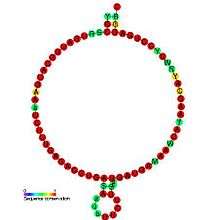Small nucleolar RNA R66
Small nucleolar RNA R66 (also known as snoR66) is a non-coding RNA (ncRNA) molecule which functions in the modification of other small nuclear RNAs (snRNAs). This type of modifying RNA is usually located in the nucleolus of the eukaryotic cell which is a major site of snRNA biogenesis. It is known as a small nucleolar RNA (snoRNA) and also often referred to as a guide RNA.
| Small nucleolar RNA R66 | |
|---|---|
 Predicted secondary structure and sequence conservation of snoR66 | |
| Identifiers | |
| Symbol | snoR66 |
| Rfam | RF00202 |
| Other data | |
| RNA type | Gene; snRNA; snoRNA; CD-box |
| Domain(s) | Eukaryota |
| GO | 0006396 0005730 |
| SO | 0000593 |
| PDB structures | PDBe |
snoR66 belongs to the C/D box class of snoRNAs which contain the conserved sequence motifs known as the C box (UGAUGA) and the D box (CUGA). Most of the members of the box C/D family function in directing site-specific 2'-O-methylation of substrate RNAs.[1]
snoR66 was identified by a computational screening of the rice Oryza sativa genome and is proposed to acts as a methylation guide for 18S ribosomal RNA in plants.[2] Rice snoR66 has also been alternatively named snoZ269. Its should also not be confused with the snoRNA identified in yeast (Saccharomyces cerevisiae) and called snR66.[3]
References
- Galardi, S.; Fatica, A.; Bachi, A.; Scaloni, A.; Presutti, C.; Bozzoni, I. (October 2002). "Purified Box C/D snoRNPs Are Able to Reproduce Site-Specific 2'-O-Methylation of Target RNA in Vitro". Molecular and Cellular Biology. 22 (19): 6663–6668. doi:10.1128/MCB.22.19.6663-6668.2002. PMC 134041. PMID 12215523.
- Chen CL, Liang D, Zhou H, Zhuo M, Chen YQ, Qu LH (2003). "The high diversity of snoRNAs in plants: identification and comparative study of 120 snoRNA genes from Oryza sativa". Nucleic Acids Res. 31 (10): 2601–13. doi:10.1093/nar/gkg373. PMC 156054. PMID 12736310.
- Lowe, T. M.; Eddy, S. R. (February 1999). "A Computational Screen for Methylation Guide snoRNAs in Yeast". Science. 283 (5405): 1168–1171. Bibcode:1999Sci...283.1168L. doi:10.1126/science.283.5405.1168. PMID 10024243.